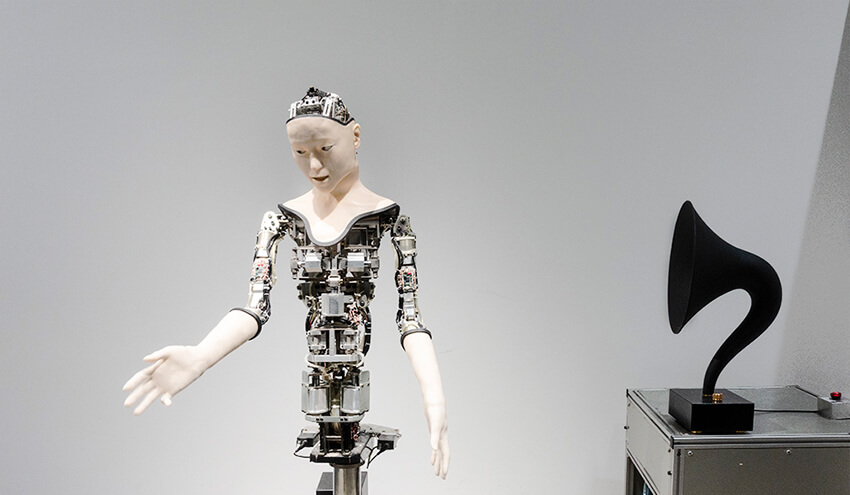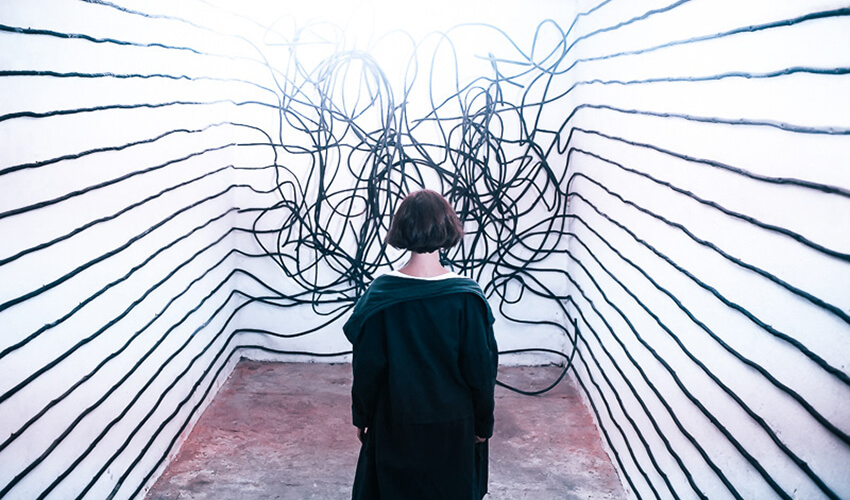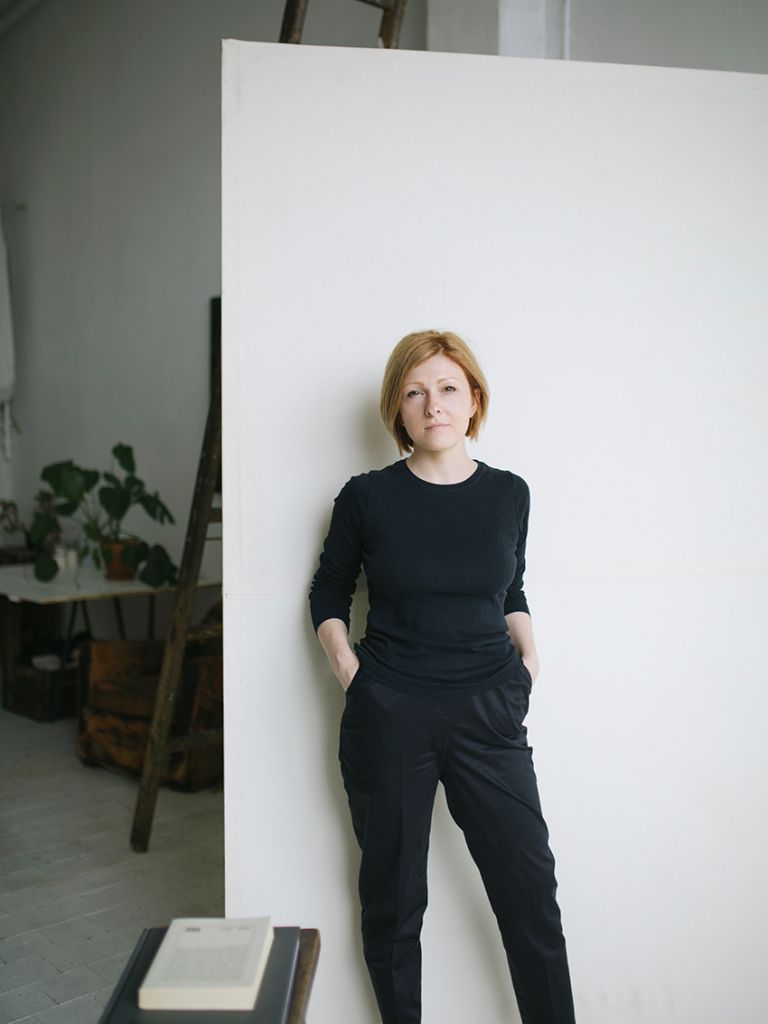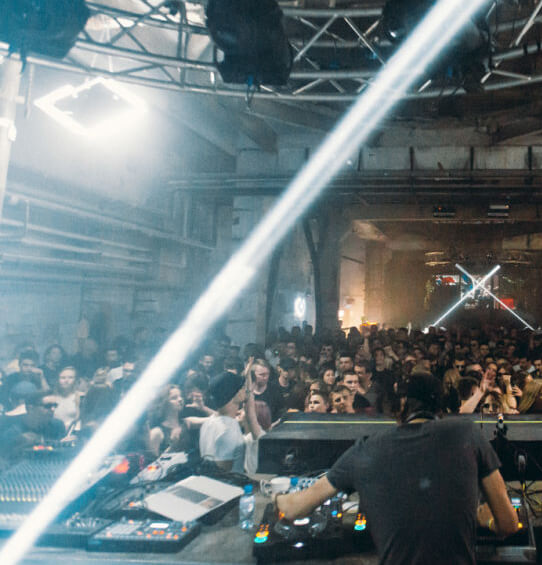Interview by Laura Netz

New media researcher, art historian and international curator in art, science and technology, Natalia Fuchs, is the curator at Gamma Festival (St. Petersburg). She will be speaking at Sónar 2019 + D (Barcelona, July 17-20) and is also one of the advisors for the exhibition AI: More than Human (Barbican Centre, London).
Natalia Fuchs is the founder of ARTYPICAL (2013), an international art relations agency which develops projects for festivals, curated exhibitions and research. During the period 2013-2016, Fuchs was appointed Curator of the Polytechnic Museum (Moscow), receiving the diploma of the Ministry of Culture as “The best educational museum project”. She also directed the multimedia art department of the National Centre for Contemporary Art (Moscow). Her latest international projects include collaborations with the ZKM Centre for Art and Media, CTM Festival in Berlin, and Lunchmeat Festival in Prague.
Furthermore, Fuchs is the curator and co-producer of the Gamma Festival of Music and Contemporary Culture (St. Petersburg, Russia). Gamma Festival represents dance, experimental and electronic music, avant-garde sound, media art and new trends of contemporary culture, but also education and interdisciplinary research, especially in the field of art, science and technology.
The great success of previous editions of the festival is because of St. Petersburg’s potential of being the new centre for European and Russian culture. Supported by the SHAPE platform and “Creative Europe”, Gamma Festival includes the most advanced projects on techno music, creative culture, and art, with ten stages and four different locations around the city. Within an international line-up, the festival also presents the Gamma LAB AI, a pre-event dedicated to research and production for artificial intelligence sound tools.
Through machine learning and exploring three musical genres – baroque, jazz and techno -the laboratory sets for musicians, musicologists, media artists, programmers and researchers to create new works or reconstruct lost ones. The results will be presented in the form of audiovisual performances, live performances and improvisations during the festival.
Moreover, the festival presents Gamma PRO, the international conference on art and technology with key international festivals representatives (SONICA, MUTEK, Future Everything, etc.); art, science and technology institutions; techie business and scientific organisations. Besides curating, Natalia Fuchs is also producing her own AV performances (behaviours w/Sonia Cillari) and video artworks (Times Connection for Everyday Transformations, 2018).



You are a new media researcher, art historian and international curator. How and when did the interest in science and technology come about?
That need for understanding interdisciplinary approaches and actually applying them came to my life quite early. When finishing primary school, I was tested to determine what type of special focus of studies I have to submit further. And it turned out that I was placed into maths and physics classes due to my strong analytical skills.
I spent 5 years in this environment and only right before the University changed the school and moved to the humanities program. After that, I think I was consciously keeping myself in the same environment choosing post-school education – my first Bachelor’s degree in Humanities but from the Technical University. After my first year of the University, I passed the state exam in High Maths and studied Astronomy and other disciplines that were available at the Technical University, complementary to the Humanities.
And, of course, I grew up in a classical family of Soviet engineers, so actually, no one of my ancestors that were building Trans-Siberian railways or working at a Steel factory in Russia – would imagine me participating in the art scene on such a scale as I do now. I should have become an engineer or physicist myself if to follow family traditions, but I made some steps forward – adjusting to technology and science with the new, individual interest of mine coming from deep love to arts and culture.
In 2013 you founded the art relations practice ARTYPICAL. What are your main aims behind this project?
My art practice is dedicated to international art relations. This is an agency for art projects with a wide scope of activities (from artistic representations to festivals, curating exhibitions and running interdisciplinary research projects). I am very much concerned about people and different border extensions with the help of culture and arts.
But the focus of my expertise within ARTYPICAL is not only on interdisciplinary collaborations but on producing new conceptual messages for this world in order to make social change for better living. I have quite a background in public relations working for a long period for large international technological companies.
Also have experience in governmental relations within cultural contexts and institutional development in a period of transitions (from Soviet to Post-Soviet, from XX century to the XXI), so that provides my partners, collaborators and clients for whom I provide art advisory with a unique mix of knowledge on cultural production and management that I am glad to share and access to an international network of digital culture specialists.
You were an advisor for the Artificial Intelligence exhibition at the Barbican Centre (London) that launched in May 2019. What has been the most rewarding part of this project? And what do you think about AI? Do you find it threatening or something we are starting to understand more and to be able to control more?
The most rewarding part was actually participating in this international research project to explore contemporary thinking about AI. We are living at a moment when stereotypical ideas are often displacing the real application of the tools of machine learning, machine vision and even the idea of general AI. So the main concern and aim were to research the history of technology and science; based on this research exhibition is created and will be developing further.
My personal interest in AI includes post-AI perspectives and future nature ideas. AI, as a philosophical idea, is changing the perception of humans about themselves continuously. This is exactly the situation when scientific and technological progress brings us into the state of the rise of spirituality. I am excited to observe, research and be part of this process that is changing our culture right now.
And I am not scared about it; I think that no one should be scared of AI – we still can’t go beyond human logic here, and, first of all, we have to develop and understand our own empathy for technology.
You are also the curator and co-producer of the Gamma Festival in St Petersburg, which is getting a lot of attention. What was the intellectual process behind this year’s edition? And how important the city and Russian culture are to articulate and crystallise a project like this?
We had an enormous boost for all festival teams last year. The edition of 2018 that I joined as a curator – and now as co-producer as well – changed the whole situation in the festival culture in Russia dramatically. Due to some specific state policies and regulations of the festivals in Moscow in recent years, we believed that we have lost the festival movement at as a concept and as a space for creativity as we used to imagine it.
But after Gamma Festival 2018 and its success with 12 000 international visitors, we realized what we have actually done: we have established an independent entity supported by local and international institutions, by local and international communities that we needed so much (despite all the problems you might hear about cultural life in Russia).
We understood that all that we are doing as a team is absolutely relevant to the international festival movement; we want to continue to work hard further. We feel responsible for this cultural phenomenon and for the new generations of creative people in Russia and worldwide to be part of it. Gamma Festival 2019 is representing dance and experimental music, media art and new trends of contemporary culture, but also education and interdisciplinary research, especially in the field of art & science and art & technology.
This makes the Gamma festival a complex project but also a dream that is becoming true, not only for all the team creating Gamma and me but for many festival goers that used to lack of such projects in Russia.
In your opinion and with your experience, what are the biggest challenges curators are facing nowadays?
I guess it’s very hard to be a critical thinker nowadays (if we talk about curators dealing with art and technology, art and science). Technological and scientific progress happening now is just overwhelming, so we have got a lack of time to experience all that we should be able to produce critics on the subject.
I am a bit fought with the speed at the moment. But hopefully, we adjust to it through structural thinking and other instruments the artistic community is currently developing for that – through constant discussions and networking online, at festivals and conferences worldwide.
Collective curating or community involvement in concept development is definitely the tool to consider. Therefore at the moment, we develop a United Curators collective together with Maurice Jones, digital culture researcher and curator, and artistic director of the MUTEK.JP festival located in Tokyo, – teaming up we work on the development of experimental art projects for all kinds of institutions interested in the interdisciplinary activities.
What is the new technological advancement you are most excited to see how artists either use it or reinterpret it?
I still think that virtual and augmented reality are actually underestimated. And we will definitely have another round of attention to this technological advancement. I am sure that something amazing could be developed at the intersection of psychoanalysis and VR/AR.
There were not so many artistic projects dealing with questions of memory, emotional attitudes and psychological patterns yet. Exploration of mind and brain functions within art & science practice always fascinates me. And I would be interested to participate as a researcher and curator in such initiatives in the future as much as possible.
What would be your biggest curating extravaganza?
My biggest curating extravaganza is actually in progress! So I wouldn’t want to share this idea at the moment and keep it for the next interview with CLOTMag!
What is your chief enemy of creativity?
Any type of worries and co-dependency in the relations with the others.
You couldn’t live without…
Love.






